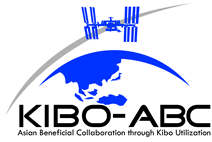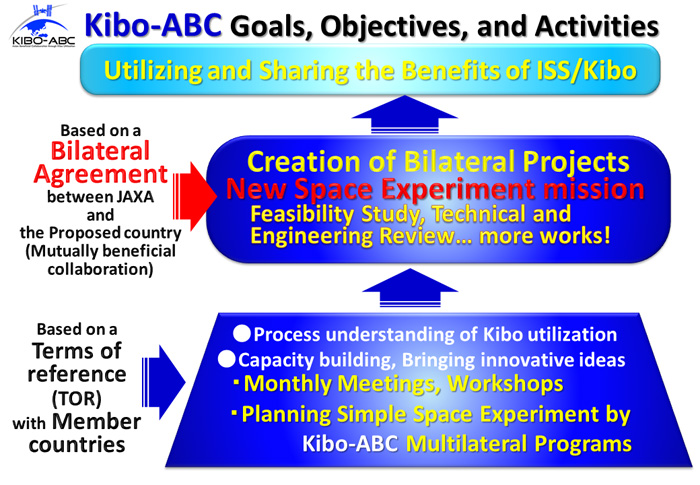Kibo-ABCAsian Beneficial Collaboration through "Kibo" Utilization
For up-to-date information about Kibo-ABC, please visit Kibo-ABC Latest News and Activities.
Objectives
Kibo-ABC is a collaborative program established by the Space Frontier Working Group (SFWG) of APRSAF, aiming to promote the utilization of the Japanese Experiment Module “Kibo” on the International Space Station in the Asia-Pacific region and to share and build on the outcomes of Kibo utilization.
The objectives of Kibo-ABC include: promotion of Kibo utilization among researchers and engineers in the Asia-Pacific region, accumulation of experience and enhancement of capacity among participating space agencies through implementation of projects utilizing Kibo, and creation of bilateral cooperation projects on Kibo utilization between member countries and Japan.
The activities are conducted jointly with member agencies that have consented to the Terms of Reference (TOR) of Kibo-ABC.
Activities
Kibo-ABC Workshop
- Discussions and consideration of creating Kibo utilization projects
- Development of multilevel cooperative relationships among participating countries in the field of space science
- Special sessions by engineers and researchers who are involved in the design and development of Kibo experiments
Space Seeds for Asian Future (2010-Present)
The human resource development and capacity building for future Kibo utilization are undertaken through the Space Seeds for Asian Future (SSAF) program. This is a small experimental program that has been devised to be optimal for new commers to Kibo experiments. The program has Kibo-ABC participants create experiment designs using familiar materials, and also enables them to experience space/ground experiments.
Well over one thousand students participated in the first project of the SSAF in 2010-2011. More than 40,000 participants from various countries contributed to creating reports in the second project conducted in 2013. Asian Herb in Space (AHiS) is the third project to be conducted in 2020-2021.
Asian Try Zero-G (2011-Present)
With the goal of promoting space experiments aboard Kibo, Japanese astronauts have been conducting selected small experiments proposed by youth from the Asia-Pacific region. This Asian Try Zero-G (ATZG) program also develops the skills needed for feasibility studies for creating Kibo experiments.
Kibo-ABC member agencies are invited to submit proposals for experiments. The agencies screen the proposals according to an agreed selection method. After feasibility assessments by JAXA, the final selection of experiment themes is determined by member agencies. Finally, the experiments are performed by an astronaut on Kibo.
Kibo Robot Programming Challenge (2020-Present)
The Kibo Robot Programming Challenge (Kibo-RPC) is an educational program in which students solve various problems by programming free-flying robots (Astrobee and Int-Ball) in Kibo. The Kibo-RPC will inspire students to develop their educational and professional goals to a higher level.
Participants will have the opportunity to learn cutting-edge methodologies and hone their skills in science, technology, engineering, and mathematics through this program. The Kibo-RPC will also expand international exchange by encouraging students to interact with other participants from around the world.
Asian Students' Parabolic Experiment Contest (2006-2013)
Young researchers and engineers are invited to test their ideas regarding “flight experiments,” which are normally implemented for on-ground verification and training purposes prior to full experimentation in space. Through such experiments, participants have learned methods of systematic operations and the importance of teamwork - both are integral to successful research projects. Former participants are now successful in various fields, including aeronautical engineering and life science.
Mini Drop Tower Demonstration
Activities involve conducting microgravity experiments using a handmade mini drop tower, whereby the microgravity environment is created, and holding seminars. This program has inspired other agencies to use mini drop towers for the dissemination of knowledge regarding basic physical phenomena under microgravity conditions.
Terms of Reference (TOR)
Members
| Country and Region | Organization |
|---|---|
| Australia | Australian Space Agency (ASA) |
| Research School of Astronomy and Astrophysics, The Australian National University (ANU) | |
| Bangladesh | National Museum of Science and Technology (NMST) |
| Indonesia | National Institute of Aeronautics and Space (LAPAN) |
| Japan | Japan Aerospace Exploration Agency(JAXA) |
| Malaysia | Malaysian Space Agency (MYSA) |
| Nepal | Nepal Scientific Activities and Research Center (NESARC) |
| New Zealand | New Zealand Space Agency (NZSA) |
| New Zealand Astrobiology Network (NZAN) | |
| Republic of the Philippines | Philippine Space Agency (PhilSA) |
| Science Education Institute, Department of Science and Technology (DOST-SEI) | |
| Republic of Korea | Korea Aerospace Research Institute (KARI) |
| Singapore | Singapore Space and Technology Limited (SSTL) |
| Space Faculty | |
| Taiwan | Taiwan Space Agency (TASA) |
| Thailand | Geo-Informatics and Space Technology Development Agency (GISTDA) |
| National Science and Technology Development Agency (NSTDA) | |
| United Arab Emirates | UAE Space Agency (UAESA) |
| Mohammed Bin Rashid Space Centre (MBRSC) | |
| Vietnam | Space Technology Institute, Vietnam Academy of Science and Technology (VAST-STI) |









